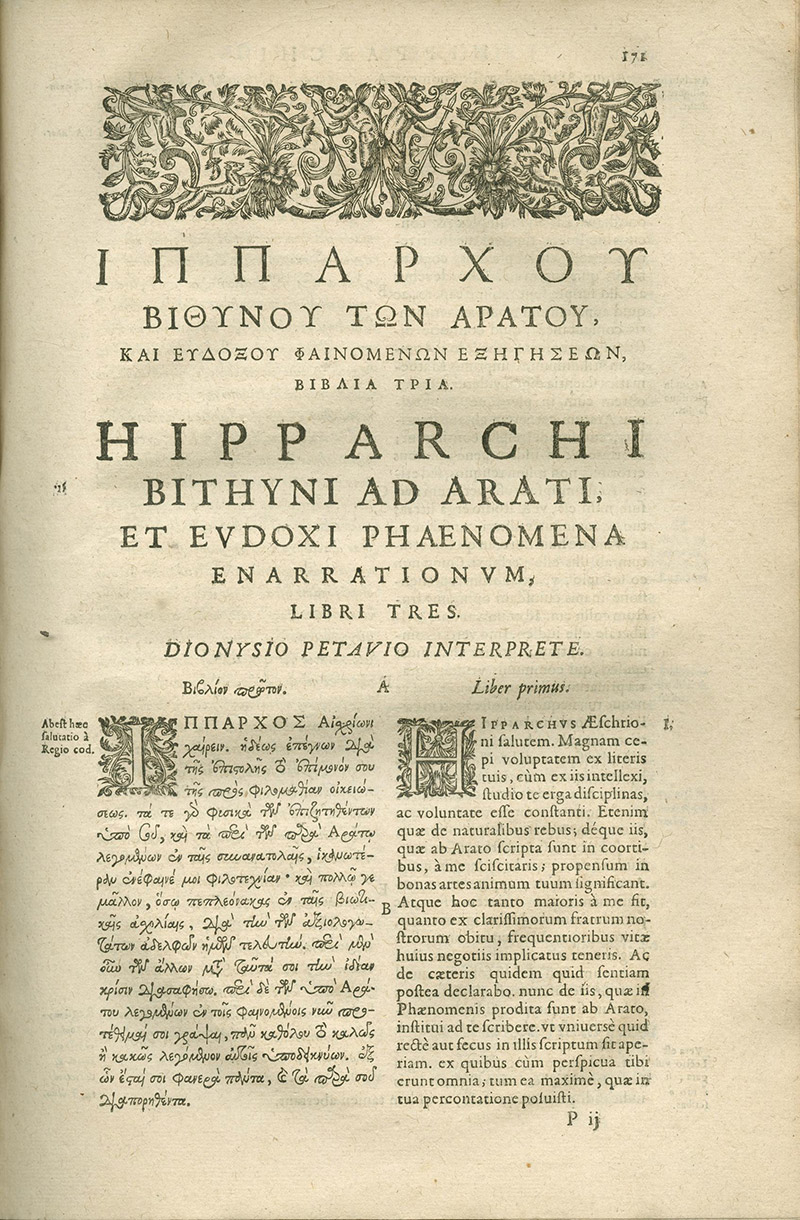The Astronomer against the Poet: Hipparchus on Aratus’ Phaenomena

- First page of Hipparchus’ Exegesis on the Phaenomena of Eudoxus and Aratus Geminus, Achilles Tatius, Hipparchus of Nicaea, et alii. Ed: Denis Pétau. Uranologion sive Systema Variorum Authorum, qui de Sphaera, ac Sideribus, eorumque Motibus Graecè Commentati sunt.
- Paris: Sébastien Cramoisy, 1630.
The page shown here is taken from a miscellaneous volume published in Paris in 1630 and collecting several ancient Greek texts on astronomy. This is the beginning of the only surviving work of Hipparchus (early second century BCE- d. after 127 BCE), the most important Hellenistic astronomer, born in Bithynia but mostly active in Rhodes. Later sources preserve many titles of his astronomical works, dealing with the study of the fixed stars, the Sun, the Moon and calendrical matters. Yet all these works are lost, and we know about his important discoveries in astronomy only through later writers and astronomers, especially Ptolemy. The only work by Hipparchus which has reached us is the present polemical commentary against Aratus’ Phaenomena. This commentary was probably one of Hipparchus’ less important works, but ironically it is the only one preserved because his polemical target, Aratus, remained popular throughout antiquity and Hipparchus’ commentary was considered part of the Aratean exegetical corpus.
For us it might seem odd that a professional astronomer felt the need to write a work against a poet, as the fields of science and poetry are now generally considered distinct and serving completely different purposes. Still, the fact that Hipparchus took the time to write a book criticizing a poem proves the importance of the genre of “scientific poetry” in the Hellenistic period and in particular the success of Aratus’ poetry. Hipparchus himself justifies his writing his commentary with the following words:
1.1.§6-7: I proposed for myself to do this not because I desire to obtain prestige by proving others wrong (for [this] is empty and entirely mean; on the contrary, I believe that we must be grateful to all those who happen to undertake hard work on their own for the common good). But [I do this] so that … the others who are intellectually curious might not be misled in the observation of the visible phenomena in the cosmos. This is something that many have suffered, as may be expected. For the beauty of the poem lends a certain sense of trustworthiness to what it is stated in it.
The problem for Hipparchus is the fact that the charm of Aratus’ poetry led many of his readers to believe that its content had scientific value. In addition, Hipparchus states (1.1.§8) that Aratus’ use of a serious astronomer, Eudoxus of Cnidus, as a source gave further credit to his poem. Yet for Hipparchus the astronomical data of Eudoxus were often incorrect—not because Eudoxus was a bad scientist but because science evolves. Still, Aratus’s poem (and this is the true problem for Hipparchus) remained popular, misleading many readers. Hipparchus therefore analyzes the astronomical section of the poem (lines 1-732) in detail criticizing it point by point. His critique is based on a larger set of observations and scientifically based stellar coordinates; in addition, Hipparchus probably used a globe, which allowed him to check other celestial data in a more precise way. In the second part of his work, Hipparchus adds his own catalogue of stars where he lists the risings and settings of 16 constellations north of the ecliptic, 14 constellations south of the ecliptic, and the 12 zodiac constellations for a total of 42 constellations (he does not list the Great Bear, the Small Bear, and the Dragon among the northern constellations because at the latitude of Rhodes they are circumpolar constellations, so they never rise or set).
Hipparchus’ attempt at demolishing Aratus’ authority in astronomy was unsuccessful, as Aratus remained popular throughout the Roman period and beyond. However, Hipparchus raised important problems, which are still relevant today: Who can speak about science? Which is the correct style for science and for reaching a wide audience? Hipparchus seems to have believed that only “real” scientists could speak about science and that the correct style was scientific prose (opposed to Aratus’ fancy poetic style). While his view, though understandable, did not ultimately win out and Aratus remained popular, Hipparchus’ critique did have some influence on the Roman translators of Aratus, some of whom seem to have corrected the original text on the basis of judgment.
Select Bibliography
- Lightfoot, Jessica. 2017. “Hipparchus’ Didactic Journey: Poetry, Prose, and Catalogue Form in the « Commentary on Aratus and Eudoxus ».” Greek, Roman and Byzantine Studies 57 (4): 935-967.
- Luiselli, Raffaele. 2015. “Hellenistic Astronomers and Scholarship.” In Brill’s Companion to Ancient Greek Scholarship, edited by Franco Montanari, Stephanos Matthaios and Antonios Rengakos, In Brill’s Companions in Classical Studies, Leiden: Brill: 1216-1234.
- Schironi, Francesca. (forthcoming). Hipparchus of Nicaea, Exegesis of the Phaenomena of Eudoxus and Aratus: Edition, Translation, and Commentary. Scientific Writings from the Ancient and Medieval World. London: Routledge.
- Toomer, Gerald J. 1978. “Hipparchus.” In Dictionary of Scientific Biography, edited by Charles Coulston Gillispie. New York: Charles Scribner’s Sons: 207-224.